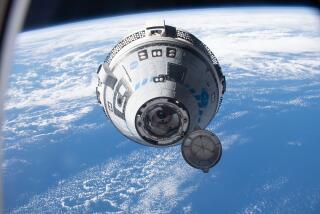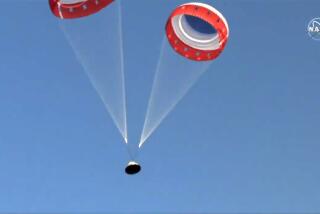Space Shuttle’s Future
I appreciated your excellent series of articles by Times staff writer Robert Lee Hotz detailing the space shuttle Columbia disaster and the subsequent investigation, including the clash between engineering and bureaucracy within NASA (Dec. 21-26). However, I was stunned by your Dec. 28 editorial, which recommended the permanent grounding of the space shuttle fleet and went even further in suggesting that the United States abdicate leadership in manned space flight.
Your editorial shows an incredible lack of forward vision. Leave it to the Russians! What kind of defeatist attitude is that? If we have identified reliability or design problems with the space shuttle we should fix them. It is ironic that less than two weeks after we celebrated the 100th anniversary of the Wright brothers’ first flight, The Times is recommending that we throw in the towel. What do you expect will happen in aerospace technology over the next 100 years? Will America take a leadership position or not? It is an unfortunate fact that failure can be a fundamental part of the engineering process. When it doesn’t work, we must redouble our efforts in order to understand why.
This process of failure, failure analysis and subsequent redesign is pretty much the history of every significant technological advance. The Wright brothers experienced more than their share, but they had the determination not to give up. Look at what has happened as a result. This process applies not just to engineering but to editorial writing as well. I think you should rip this one up and start again.
Matt Gorder
Riverside
*
Thank you for the series on NASA and the space shuttle. I had to receive a hug from my son midway through reading the final piece. NASA, the U.S. government and its citizens and legislators whose responsibility it was to see how money was being spent all share culpability in the disaster of last February. The mismanagement that led to the tragedy and the near-farce of early efforts to piece together the shuttle accident (literally and otherwise) are almost criminal.
Reluctantly, I agree: The fleet should be grounded. I do not trust the agency to regroup with a fleet that has been utilized far longer than was intended. I do, however, think the United States should maintain a strong presence in space, both in manned and unmanned programs. Any manned efforts must have a level of oversight that does not currently exist. We can learn a lot about our solar system, our universe and ourselves through the exploration of space. I pray the fallout from the last shuttle disaster will not scuttle the entire manned space program. That too would be a disaster of epic proportions.
Amy Litton
Costa Mesa
*
The aerospace industry, a.k.a. military-industrial complex, is a place of nightmarish absurdity. There are no hard data because everyone lies. Approaching one’s duties responsibly with integrity is a sure-fire ticket to unemployment. The death of an astronaut or pilot or passenger is always someone else’s fault. Blueprints and other documents exist only as items of currency; God help the fool who follows them blindly.
Ground the space shuttle? Why? You might as well cease activity in all “sausage factories,” but -- what the hell -- ask John Glenn. If he’s for it, I’m for it.
Ronald Webster
Long Beach
*
I must respectfully disagree with your editorial on grounding the remaining space shuttles. Without a replacement vehicle flight-ready for at least 10 years, it is essential for the completion of the International Space Station, as well as full resupply and boosting to a higher orbit, that shuttle missions resume as soon as it is safe to do so. Congress is partially at fault in tearing up NASA funding, as is NASA’s culture itself, but that is no excuse to ground a vehicle with only two failures in 112 missions.
Your editorial insistence on relying on unreliable Russian space systems and robots smacks of Luddite thinking. The editorial also does a disservice to the astronaut corps, the young people who wish to be astronauts and the memory of the crews of both Challenger and Columbia.
Robotic spaceflight, while having its uses in going where it is impractical to send humans at the present time, does not have the flexibility that human spaceflight does: ability to explore a hunch, capability to recover, repair and relaunch satellites (as demonstrated on Hubble Space Telescope repair flights and at least three other missions) and the time-honored desire to send people to places “where no man has gone before.” NASA should finish the space station, then embark on the next great manned space adventure: Return to the moon and press on to Mars.
Matt Wiser
Auberry, Calif.


